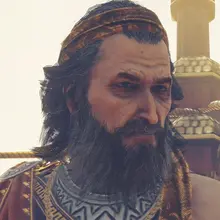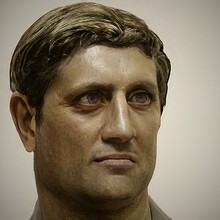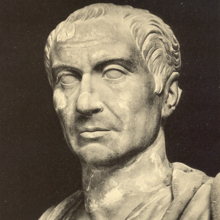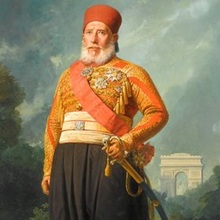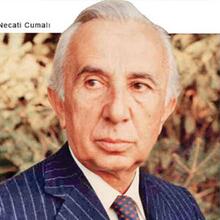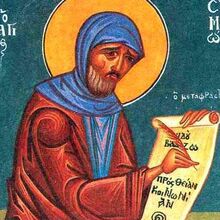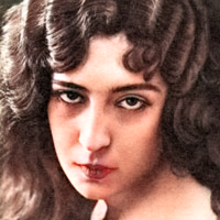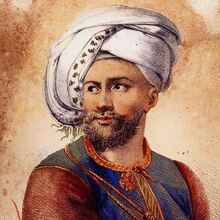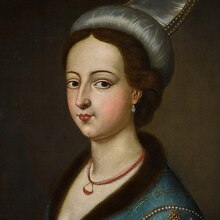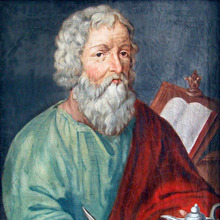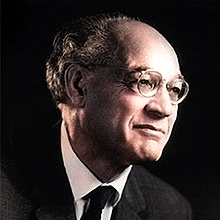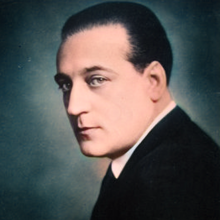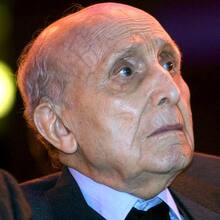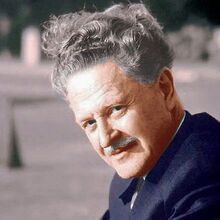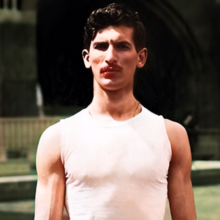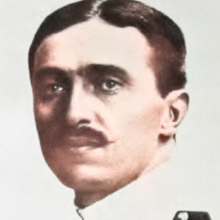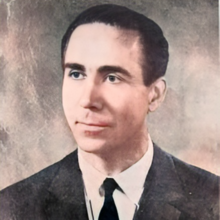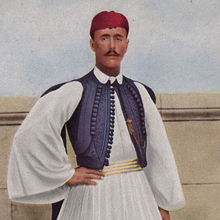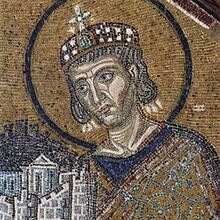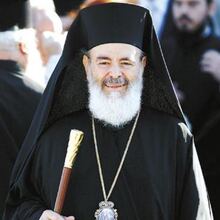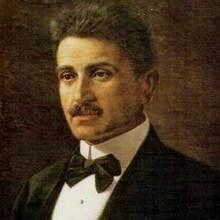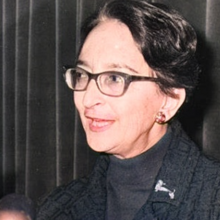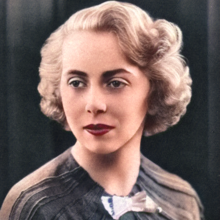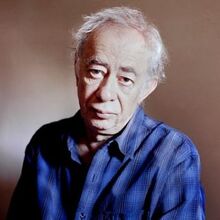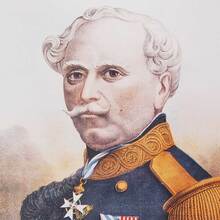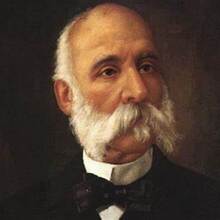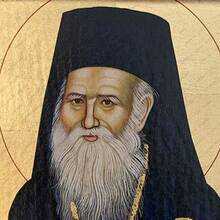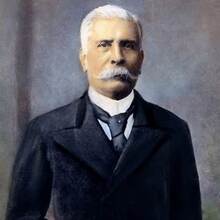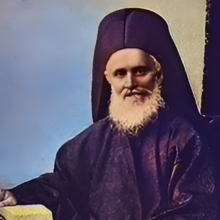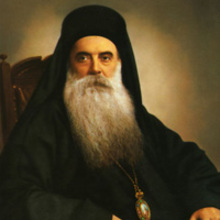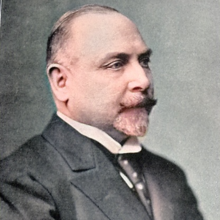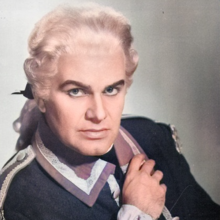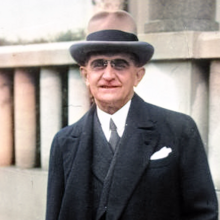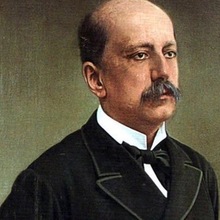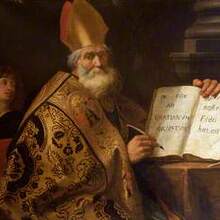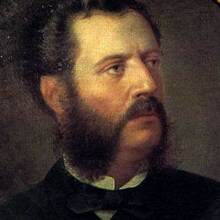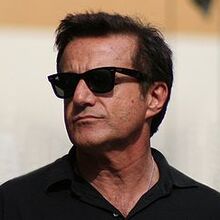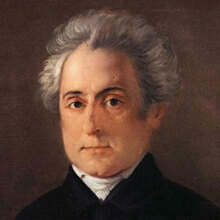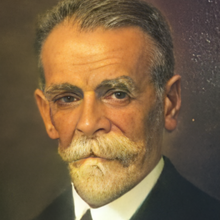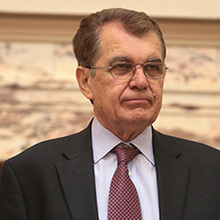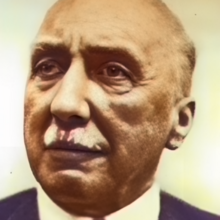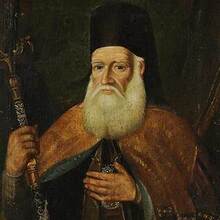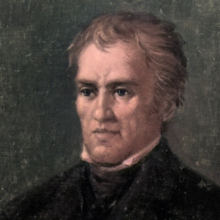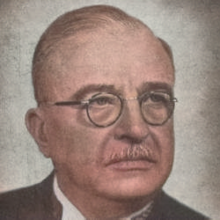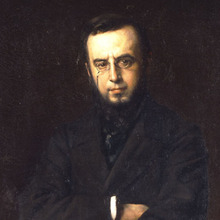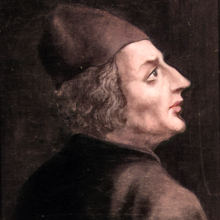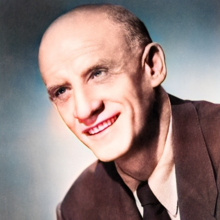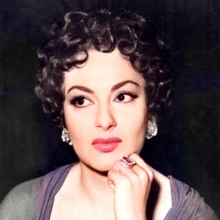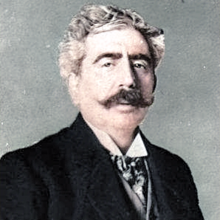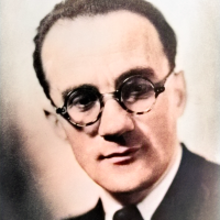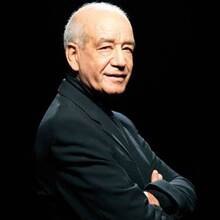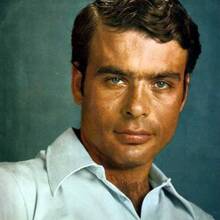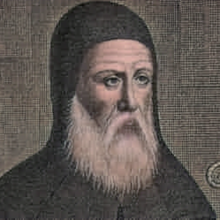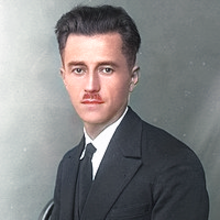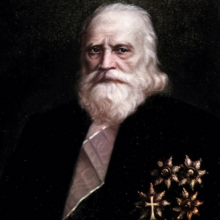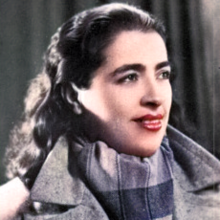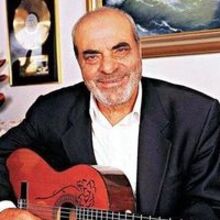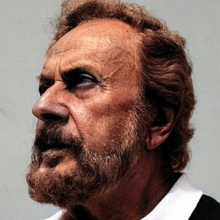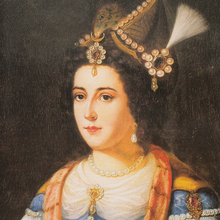 Demetrius Vikelas
1835 - 1908
Businessman and writer
Demetrius Vikelas
1835 - 1908
Businessman and writer
 Theodoros Diligiannis
1826 - 1905
Prime Minister of Greece
Theodoros Diligiannis
1826 - 1905
Prime Minister of Greece
 Giannis Poulopoulos
1941 - 2020
Singer-songwriter
Giannis Poulopoulos
1941 - 2020
Singer-songwriter
 Hippocrates
-460 - -370
Father of medicine
Hippocrates
-460 - -370
Father of medicine
 Grigoris Lambrakis
1912 - 1963
Physician, lecturer, Member of Parliament
Grigoris Lambrakis
1912 - 1963
Physician, lecturer, Member of Parliament
 Olubayo Adefemi
1985 - 2011
Defender
Olubayo Adefemi
1985 - 2011
Defender
 Pargali Ibrahim Pasha
1495 - 1536
Grand Vizier of the Ottoman Empire
Pargali Ibrahim Pasha
1495 - 1536
Grand Vizier of the Ottoman Empire
 El Greco
1541 - 1614
Painter and architect of the Spanish Renaissance
El Greco
1541 - 1614
Painter and architect of the Spanish Renaissance
 Angelique Ionatos
1954 - 2021
Singer and composer
Angelique Ionatos
1954 - 2021
Singer and composer
 Pothinus
-177 - -47
Regent for Ptolemy XIII
Pothinus
-177 - -47
Regent for Ptolemy XIII
 Ali Dino
1890 - 1938
Cartoonist and Member of the Greek Parliament
Ali Dino
1890 - 1938
Cartoonist and Member of the Greek Parliament
 Constantine Kanaris
1921 - 1997
Greek naval hero and prime minister
Constantine Kanaris
1921 - 1997
Greek naval hero and prime minister
 Dimitri Mitropoulos
1896 - 1960
Conductor, pianist, composer
Dimitri Mitropoulos
1896 - 1960
Conductor, pianist, composer
 Aspasia Manos
1896 - 1972
Wife of King Alexander I of Greece
Aspasia Manos
1896 - 1972
Wife of King Alexander I of Greece
 Georgios Papandreou
1888 - 1968
prime minister of Greece
Georgios Papandreou
1888 - 1968
prime minister of Greece
 Constantine Kanaris
1790 - 1877
Greek naval hero and prime minister
Constantine Kanaris
1790 - 1877
Greek naval hero and prime minister
 Vassilis Alexakis
1943 - 2021
Writer and self-translator
Vassilis Alexakis
1943 - 2021
Writer and self-translator
 Dimitris Kremastinos
1942 - 2020
cardiologist and health minister
Dimitris Kremastinos
1942 - 2020
cardiologist and health minister
 Konstantinos Tsiklitiras
1888 - 1913
Olympic champion in standing long jump
Konstantinos Tsiklitiras
1888 - 1913
Olympic champion in standing long jump
 Katina Paxinou
1900 - 1973
Film and stage actress
Katina Paxinou
1900 - 1973
Film and stage actress
 Konstantinos Theotokis
1872 - 1923
Novelist of the realist school
Konstantinos Theotokis
1872 - 1923
Novelist of the realist school
 Timothy
17 - 97
Disciple of Paul the Apostle
Timothy
17 - 97
Disciple of Paul the Apostle
 Melina Mercouri
1920 - 1994
actress, politician, activist
Melina Mercouri
1920 - 1994
actress, politician, activist
 Aristotle
-384 - -322
Philosopher
Aristotle
-384 - -322
Philosopher
 Odysseas Elytis
1911 - 1996
Poet and Nobel laureate
Odysseas Elytis
1911 - 1996
Poet and Nobel laureate
 Nico Minardos
1930 - 2011
Actor and producer
Nico Minardos
1930 - 2011
Actor and producer
 Necati Cumali
1921 - 2001
Writer and poet
Necati Cumali
1921 - 2001
Writer and poet
 Yannis Ritsos
1909 - 1990
Poet and activist
Yannis Ritsos
1909 - 1990
Poet and activist
 Anastasios Metaxas
1862 - 1937
Architect and shooter
Anastasios Metaxas
1862 - 1937
Architect and shooter
 Princess Katherine of Greece and Denmark
1913 - 2007
Painter
Princess Katherine of Greece and Denmark
1913 - 2007
Painter
 Alexander the Great
-356 - -323
King of Macedon and Hegemon of the Hellenic League
Alexander the Great
-356 - -323
King of Macedon and Hegemon of the Hellenic League
 Constantine I
272 - 337
Roman emperor, first Christian emperor
Constantine I
272 - 337
Roman emperor, first Christian emperor
 Ibrahim Pasha of Egypt
1789 - 1848
General and viceroy of Egypt
Ibrahim Pasha of Egypt
1789 - 1848
General and viceroy of Egypt
 Artemisia I of Caria
350 - 450
Queen of Halicarnassus and ally of Xerxes I
Artemisia I of Caria
350 - 450
Queen of Halicarnassus and ally of Xerxes I
 Clement of Alexandria
150 - 215
Christian apologist
Clement of Alexandria
150 - 215
Christian apologist
 Prince George of Greece and Denmark
1869 - 1957
High Commissioner of the Cretan State
Prince George of Greece and Denmark
1869 - 1957
High Commissioner of the Cretan State
 Prince Nicholas of Greece and Denmark
1872 - 1938
Prince and painter
Prince Nicholas of Greece and Denmark
1872 - 1938
Prince and painter
 Theophanes the Confessor
732 - 817
Monk and chronicler
Theophanes the Confessor
732 - 817
Monk and chronicler
 Pericles
-495 - -429
Leader of Athens
Pericles
-495 - -429
Leader of Athens
 Jacques Damala
1855 - 1889
Actor and husband of Sarah Bernhardt
Jacques Damala
1855 - 1889
Actor and husband of Sarah Bernhardt
 Pythagoras
-570 - -495
Mathematics
Pythagoras
-570 - -495
Mathematics
 Salamo Arouch
1923 - 2009
Boxer
Salamo Arouch
1923 - 2009
Boxer
 Spartacus
-71 - -111
Slave rebellion leader
Spartacus
-71 - -111
Slave rebellion leader
 Dionysios Solomos
1798 - 1857
Writer of the Hymn to Liberty
Dionysios Solomos
1798 - 1857
Writer of the Hymn to Liberty
 Hagop Hagopian
1951 - 1988
Founder and leader of ASALA
Hagop Hagopian
1951 - 1988
Founder and leader of ASALA
 Gregory Palamas
1296 - 1357
Orthodox monk and archbishop of Thessalonica
Gregory Palamas
1296 - 1357
Orthodox monk and archbishop of Thessalonica
 Georgios Papanikolaou
1883 - 1962
Medical Innovator
Georgios Papanikolaou
1883 - 1962
Medical Innovator
 Socrates
-469 - -399
Philosopher
Socrates
-469 - -399
Philosopher
 Heraclitus
-535 - -475
Pre-Socratic philosopher
Heraclitus
-535 - -475
Pre-Socratic philosopher
 Dimitris Mitropanos
1948 - 2012
Singer of laiko and entekhno music
Dimitris Mitropanos
1948 - 2012
Singer of laiko and entekhno music
 Markos Botsaris
1790 - 1823
Leader of the Souliots and general of the Greek
Markos Botsaris
1790 - 1823
Leader of the Souliots and general of the Greek
 Nikolaos Makarezos
1919 - 2009
Army officer and junta leader
Nikolaos Makarezos
1919 - 2009
Army officer and junta leader
 Alexandros Papagos
1883 - 1955
General and Prime Minister of Greece
Alexandros Papagos
1883 - 1955
General and Prime Minister of Greece
 Helen of Troy
-1200 - -1242
Queen of Sparta, cause of the Trojan War
Helen of Troy
-1200 - -1242
Queen of Sparta, cause of the Trojan War
 Charilaos Trikoupis
1832 - 1896
Prime Minister of Greece
Charilaos Trikoupis
1832 - 1896
Prime Minister of Greece
 Anacreon
-582 - -485
Lyric poet
Anacreon
-582 - -485
Lyric poet
 Rigas Feraios
1757 - 1798
Leader of the Greek Enlightenment
Rigas Feraios
1757 - 1798
Leader of the Greek Enlightenment
 Hyginus
100 - 142
Bishop of Rome
Hyginus
100 - 142
Bishop of Rome
 Alexandros Koumoundouros
1815 - 1883
Prime Minister of Greece
Alexandros Koumoundouros
1815 - 1883
Prime Minister of Greece
 Helen Vlachos
1911 - 1995
Newspaper publisher and anti-junta activist
Helen Vlachos
1911 - 1995
Newspaper publisher and anti-junta activist
 Manolis Glezos
1922 - 2020
Resistance fighter and journalist
Manolis Glezos
1922 - 2020
Resistance fighter and journalist
 Gulnus Sultan
1642 - 1715
Haseki Sultan of Mehmed IV
Gulnus Sultan
1642 - 1715
Haseki Sultan of Mehmed IV
 Mother Teresa
1910 - 1997
Mother Teresa
1910 - 1997
 Georgios Papadopoulos
1919 - 1999
Leader of the Greek military junta of 1967–1974
Georgios Papadopoulos
1919 - 1999
Leader of the Greek military junta of 1967–1974
 Mid'hat Frasheri
1880 - 1949
Founder of Balli Kombëtar
Mid'hat Frasheri
1880 - 1949
Founder of Balli Kombëtar
 Democritus
-370 - -460
Philosopher and scientist
Democritus
-370 - -460
Philosopher and scientist
 Plato
-427 - -347
philosopher
Plato
-427 - -347
philosopher
 Alexander of Greece
1893 - 1920
King of the Hellenes
Alexander of Greece
1893 - 1920
King of the Hellenes
 Yvonne Sanson
1925 - 2003
Melodrama star
Yvonne Sanson
1925 - 2003
Melodrama star
 Epicurus
-341 - -270
Founder of Epicureanism
Epicurus
-341 - -270
Founder of Epicureanism
 Markos Vafiades
1906 - 1992
Communist leader and guerrilla commander
Markos Vafiades
1906 - 1992
Communist leader and guerrilla commander
 Kostas Paskalis
1929 - 2007
Opera singer
Kostas Paskalis
1929 - 2007
Opera singer
 Ptolemy II Philadelphus
308 - 246
King of Egypt, patron of arts and sciences
Ptolemy II Philadelphus
308 - 246
King of Egypt, patron of arts and sciences
 Sappho
-630 - -570
Lyric poet
Sappho
-630 - -570
Lyric poet
 Aristotelis Valaoritis
1824 - 1879
Poet and politician of the Heptanese School
Aristotelis Valaoritis
1824 - 1879
Poet and politician of the Heptanese School
 Jean Moreas
1856 - 1910
Symbolist poet and critic
Jean Moreas
1856 - 1910
Symbolist poet and critic
 Porphyrios Bairaktaris
1906 - 1991
Athonite hieromonk and spiritual father
Porphyrios Bairaktaris
1906 - 1991
Athonite hieromonk and spiritual father
 Kosem Sultan
1589 - 1651
Sultana and regent of the Ottoman Empire
Kosem Sultan
1589 - 1651
Sultana and regent of the Ottoman Empire
 Maurice Abravanel
1903 - 1993
Music director of the Utah Symphony
Maurice Abravanel
1903 - 1993
Music director of the Utah Symphony
 Stylianos Pattakos
1912 - 2016
Military officer and junta leader
Stylianos Pattakos
1912 - 2016
Military officer and junta leader
 Fikriye Hanim
1887 - 1924
Relative and lover of Mustafa Kemal Atatürk
Fikriye Hanim
1887 - 1924
Relative and lover of Mustafa Kemal Atatürk
 Aesop
-564 - -620
Fabulist and storyteller
Aesop
-564 - -620
Fabulist and storyteller
 Prince Andrew of Greece and Denmark
1882 - 1944
Prince of Greece and Denmark
Prince Andrew of Greece and Denmark
1882 - 1944
Prince of Greece and Denmark
 Eugenios Voulgaris
1716 - 1806
Cleric, author, educator, mathematician
Eugenios Voulgaris
1716 - 1806
Cleric, author, educator, mathematician
 Phidias
-490 - -430
Sculptor of the gods
Phidias
-490 - -430
Sculptor of the gods
 Leonidas I
540 - 480
Spartan King
Leonidas I
540 - 480
Spartan King
 Plutarch
46 - 119
Biographer of Parallel Lives and author of Moralia
Plutarch
46 - 119
Biographer of Parallel Lives and author of Moralia
 Demetrios Chalkokondyles
1423 - 1511
Greek scholar and professor
Demetrios Chalkokondyles
1423 - 1511
Greek scholar and professor
 Diophantus
-200 - -284
Author of Arithmetica
Diophantus
-200 - -284
Author of Arithmetica
 George II of Greece
1890 - 1947
King of Greec
George II of Greece
1890 - 1947
King of Greec
 Stavros Spyrou Niarchos
1909 - 1996
Shipping tycoon and art collector
Stavros Spyrou Niarchos
1909 - 1996
Shipping tycoon and art collector
 Aliki Vougiouklaki
1934 - 1996
Actress, singer and theatrical producer
Aliki Vougiouklaki
1934 - 1996
Actress, singer and theatrical producer
 Adamantios Korais
1748 - 1833
Greek humanist scholar
Adamantios Korais
1748 - 1833
Greek humanist scholar
 Homer
-701 - -800
Epic poet
Homer
-701 - -800
Epic poet
 Nikos Kazantzakis
1883 - 1957
Writer and philosopher
Nikos Kazantzakis
1883 - 1957
Writer and philosopher
 Euclid
265 - 300
Mathematician
Euclid
265 - 300
Mathematician
 Gregory V of Constantinople
1746 - 1821
Ecumenical Patriarch of Constantinople
Gregory V of Constantinople
1746 - 1821
Ecumenical Patriarch of Constantinople
 Medea
-1300 - -1350
Helper of Jason and the Argonauts
Medea
-1300 - -1350
Helper of Jason and the Argonauts
 Cyril Lucaris
1572 - 1638
Patriarch of Constantinople and Alexandria
Cyril Lucaris
1572 - 1638
Patriarch of Constantinople and Alexandria
 Christodoulos Paraskevaidis
1939 - 2008
Archbishop of Athens and All Greece
Christodoulos Paraskevaidis
1939 - 2008
Archbishop of Athens and All Greece
 Nikolaos Sokrates Politis
1872 - 1942
International lawyer, diplomat, scholar
Nikolaos Sokrates Politis
1872 - 1942
International lawyer, diplomat, scholar
 Leonidas Pelekanakis
1962 - 2021
sailor
Leonidas Pelekanakis
1962 - 2021
sailor
 Constantine I
272 - 337
Roman emperor and Christian convert
Constantine I
272 - 337
Roman emperor and Christian convert
 Raoul Aslan
1886 - 1958
Theater actor and director
Raoul Aslan
1886 - 1958
Theater actor and director
 Penelope
-1230 - -1160
Queen of Ithaca and faithful wife of Odysseus
Penelope
-1230 - -1160
Queen of Ithaca and faithful wife of Odysseus
 Daniel Carasso
1905 - 2009
Founder of Danone and Dannon
Daniel Carasso
1905 - 2009
Founder of Danone and Dannon
 Thucydides
-400 - -460
Author of the History of the Peloponnesian War
Thucydides
-400 - -460
Author of the History of the Peloponnesian War
 Princess Cecilie of Greece and Denmark
1911 - 1937
Princess
Princess Cecilie of Greece and Denmark
1911 - 1937
Princess
 Theodoros Kolokotronis
1770 - 1843
General and leader of the Greek War
Theodoros Kolokotronis
1770 - 1843
General and leader of the Greek War
 Solon
-560 - -630
Reformer of Athens and founder of democracy
Solon
-560 - -630
Reformer of Athens and founder of democracy
 Simeon Metaphrastes
900 - 1000
Hagiographer and writer
Simeon Metaphrastes
900 - 1000
Hagiographer and writer
 Titos Vandis
1917 - 2003
Stage and screen actor
Titos Vandis
1917 - 2003
Stage and screen actor
 John III Ducas Vatatzes
1192 - 1254
Emperor of Nicaea and Byzantine ruler
John III Ducas Vatatzes
1192 - 1254
Emperor of Nicaea and Byzantine ruler
 Sophocles
-496 - -406
Tragic playwright and poet
Sophocles
-496 - -406
Tragic playwright and poet
 Germanus I of Constantinople
634 - 740
Patriarch of Constantinople and theologian
Germanus I of Constantinople
634 - 740
Patriarch of Constantinople and theologian
 Princess Sophie of Greece and Denmark
1914 - 2001
Princess of Hesse-Kassel and Hanover
Princess Sophie of Greece and Denmark
1914 - 2001
Princess of Hesse-Kassel and Hanover
 Kristo Negovani
1875 - 1905
Author of Istori e dhiatësë vietërë
Kristo Negovani
1875 - 1905
Author of Istori e dhiatësë vietërë
 Andreas Kalvos
1792 - 1869
Poet of the Romantic school
Andreas Kalvos
1792 - 1869
Poet of the Romantic school
 Olga of Greece and Denmark
1903 - 1997
Princess consort and regent of Yugoslavia
Olga of Greece and Denmark
1903 - 1997
Princess consort and regent of Yugoslavia
 Xenophon
-430 - -354
Military leader, writer, student of Socrates
Xenophon
-430 - -354
Military leader, writer, student of Socrates
 Jerzy Ivanov-Szajnowicz
1911 - 1943
Saboteur in the Greek Resistance
Jerzy Ivanov-Szajnowicz
1911 - 1943
Saboteur in the Greek Resistance
 Nikos Skalkottas
1904 - 1949
modernist composer and violinist
Nikos Skalkottas
1904 - 1949
modernist composer and violinist
 Stelios Kazantzidis
1931 - 2001
Singer of Greek popular music
Stelios Kazantzidis
1931 - 2001
Singer of Greek popular music
 Alexandra of Yugoslavia
1921 - 1993
Queen consort of Yugoslavia
Alexandra of Yugoslavia
1921 - 1993
Queen consort of Yugoslavia
 Namik Kemal
1840 - 1888
Poet, playwright and social reformer
Namik Kemal
1840 - 1888
Poet, playwright and social reformer
 Dimitrios Kallergis
1803 - 1867
Fighter of the Greek War of Independence
Dimitrios Kallergis
1803 - 1867
Fighter of the Greek War of Independence
 Georgios Hatzidakis
1843 - 1941
Linguist and philologist
Georgios Hatzidakis
1843 - 1941
Linguist and philologist
 Dimitrios Loundras
1885 - 1970
Gymnast and naval officer
Dimitrios Loundras
1885 - 1970
Gymnast and naval officer
 Anthimus VII Tsatsos
1827 - 1913
Ecumenical Patriarch of Constantinople
Anthimus VII Tsatsos
1827 - 1913
Ecumenical Patriarch of Constantinople
 Ioannis Kapodistrias
1776 - 1831
First head of state of independent Greece
Ioannis Kapodistrias
1776 - 1831
First head of state of independent Greece
 Helen of Greece and Denmark
1896 - 1982
Princess of Greece and Denmark
Helen of Greece and Denmark
1896 - 1982
Princess of Greece and Denmark
 George Gordon Byron
1788 - 1824
Poet and laureate
George Gordon Byron
1788 - 1824
Poet and laureate
 Kostis Palamas
1859 - 1943
Poet and lyricist of the Olympic Hymn
Kostis Palamas
1859 - 1943
Poet and lyricist of the Olympic Hymn
 Alexandros Mavrokordatos
1791 - 1865
Prime Minister of Greece
Alexandros Mavrokordatos
1791 - 1865
Prime Minister of Greece
 Spyridon Louis
1873 - 1940
Runner
Spyridon Louis
1873 - 1940
Runner
 Athanasios Diakos
1788 - 1821
Military commander during the Greek independence
Athanasios Diakos
1788 - 1821
Military commander during the Greek independence
 Nazim Hikmet
1902 - 1963
Poet, playwright, novelist, screenwriter
Nazim Hikmet
1902 - 1963
Poet, playwright, novelist, screenwriter
 Teodor Keko
1958 - 2002
Writer, journalist, politician
Teodor Keko
1958 - 2002
Writer, journalist, politician
 Athenagoras I of Constantinople
1886 - 1972
Ecumenical Patriarch of Constantinople
Athenagoras I of Constantinople
1886 - 1972
Ecumenical Patriarch of Constantinople
We Need -- admin in

